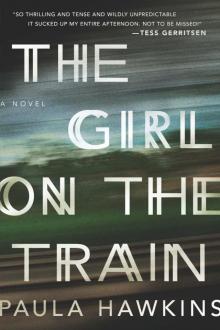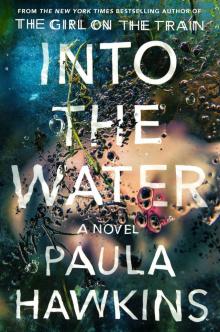- Home
- Paula Hawkins
Into the Water Page 8
Into the Water Read online
Page 8
I kept seeing the way Lena looked at DI Townsend, the tone of her voice when she called him by his first name (his first name?), the way he looked at her. I wondered whether what she’d told them about the bracelet was true. It rang false to me, because you’d been so quick to claim it, to make it yours. It was possible, I supposed, that you only insisted on taking it because you knew how much I wanted it. When you found it amongst Mum’s things and slipped it onto your wrist, I complained to Dad (yes, telling tales again). I asked, Why should she have it? Why not? you replied. I’m the eldest. And when he was gone, you smiled as you admired it on your wrist. It suits me, you said. Don’t you think it suits me? Pinching a layer of fat on my forearm. I doubt it would fit around your chubby little arm.
I wiped my eyes. You stung me like that often; cruelty always was your strong suit. Some jibes—about my size, about how slow I was, how dull—I shrugged off. Others—Come on, Julia, tell me honestly. Wasn’t there some part of you that liked it?—were barbs embedded deep in my flesh, irrecoverable unless I wanted to tear open fresh wounds. That last one, slurred into my ear on the day we buried our mother—oh, I could happily have strangled you with my bare hands for those words. And if you did that to me, if you were capable of making me feel like that, who else did you make murderous?
Down in the bowels of the house, in your study, I began to sift through your papers. I started with the mundane stuff. From the wooden filing cabinets against the wall I retrieved files containing medical records for you and Lena, a birth certificate for Lena, with no father named. I’d known that would be the case, of course; this was one of your mysteries, one of your secrets held tight to your chest. But for even Lena not to know? (I had to wonder, unkindly, whether you genuinely didn’t know either.)
There were school reports, from the Park Slope Montessori in Brooklyn and from the local primary and secondary here in Beckford. The deeds to the house, a life-insurance policy (Lena the beneficiary), bank statements, investment accounts. All the ordinary debris of a relatively well-ordered life, with no secrets to spill, no hidden truths to tell.
In the lower drawers were your files relating to the “project”: boxes filled with rough prints of pictures, pages of notes, some typed, some in your own spidery hand, in blue and green ink, words crossed out and capitalized and underlined, like the ravings of a conspiracy theorist. A madwoman. Unlike the other files, the administrative ones, none of it was in order; everything was a mess, all jumbled up. As though someone had been through the files, looking for something. My skin prickled, my mouth was dry. The police have been through them, of course. They had your computer, but they’d still want to see this. Maybe they’ve been looking for a note.
I flicked through the first box of pictures. They were mostly of the pool, the rocks, the little sandy beach. On some, you’d marked things on the borders, codes I couldn’t decipher. There were photos of Beckford, too: its streets and houses, the pretty stone ones and uglier new ones. One of these was pictured over and over, a plain Edwardian semi with dirty curtains, half drawn. There were pictures of the town centre, the bridge, the pub, the church, the graveyard. Libby Seeton’s grave.
Poor Libby. You were obsessed with her when you were a child. I hated the story, sad and cruel as it was, but you wanted to hear it over and over again. You wanted to hear how Libby, still a child, was brought to the water, accused of witchcraft. Why? I’d ask, and our mother would say, Because she and her aunt knew about herbs and plants. They knew how to make medicine. That seemed a stupid reason, but adult stories were full of stupid cruelties: little children turned away at the school gates because their skin was the wrong colour; people beaten or killed for worshipping the wrong god. Later you told me that it wasn’t about making medicine, it was because Libby seduced (you explained the word) an older man and enticed him to leave his wife and child. That didn’t diminish her in your eyes; it was a sign of her power.
When you were little, six or seven, you insisted on wearing one of Mum’s old skirts to the pool; it trailed in the dirt although you’d pulled it up under your chin. You climbed up the rocks and flung yourself into the water while I played on the beach. You were Libby: Look, Mum! Look! Do you think I’ll sink or swim?
I can see you doing it, the excitement on your face. I can feel my mother’s soft hand in mine, warm sand between my toes as we watched you. That doesn’t make any sense: if you were six or seven, then I was two or three—there’s no way I could remember that, could I?
I thought about the lighter that I found in your drawer, about the initials engraved on it. LS. Is this for Libby? Really, Nel? Were you really so obsessed with a three-hundred-year-long-dead girl that you had her initials engraved on your belongings? Maybe not. Maybe you weren’t obsessed. Maybe you just liked the idea of being able to hold her in your palm.
I returned to the files, looking for more about Libby. I sorted through printed pages of type and photos, printouts of old newspaper articles, cuttings from magazines, here and there your indelicate scrawl on the edge of the pages, illegible usually, rarely clear. There were names I’d heard of and names I hadn’t: Libby and Mary, Anne and Katie and Ginny and Lauren, and there, at the top of Lauren’s entry, in thick black ink, you had written: Beckford is not a suicide spot. Beckford is a place to get rid of troublesome women.
THE DROWNING POOL
1679
LIBBY
Yesterday they said tomorrow, so that’s today now. She knows it won’t be long. They’ll come to take her to the water, to swim her. She wants it to come, wills it to come, it can’t come soon enough. She’s tired of feeling so dirty, of the itch on her skin. Knows it won’t really help with the sores, putrid now and smelling bad. She needs elderberry, or marigold maybe, she’s not sure what would be best, or whether it’s too late to do anything at all. Aunt May would know, but she’s gone now, swung from a gibbet these eight months past.
Libby likes the water, loves the river though she’s afraid of the deep. It’ll be cold enough to freeze her now, but at least it’ll take the insects from her skin. They shaved her when they first arrested her, but the hair’s grown back a bit now, and there are things crawling everywhere, burrowing into her, she feels them in her ears, at the corners of her eyes and in between her legs. She scratches until she bleeds. It’ll be good to have all that washed away, the smell of the blood, of herself.
They come in the morning. Two men, young, rough-handed, rough-mouthed, she’s felt their fists before. No more though, they’re careful about that, because they heard what the man said, the one who saw her in the forest, her legs spread and the Devil between them. They laugh and slap, but they’re afraid of her, too, and in any case, she’s not much to look at these days.
She wonders, will he be there to watch her, and what will he think? He thought her beautiful once, but now her teeth are rotting, and her skin is mottled blue and purple as though she were half dead already.
They take her to Beckford, where the river turns sharp around the cliff and then runs slow, slow and deep. This is where she’ll swim.
It is autumn, a cold wind blowing, but the sun is bright and so she feels ashamed, stripped there in the bright light before all the men and women of the village. She thinks she can hear them gasp, in horror or surprise, at what’s become of lovely Libby Seeton.
She’s bound with ropes thick and rough enough to bring bright, fresh blood to her wrists. Just her arms. Legs left free. Then they tie a rope around her waist, so that should she sink, they can bring her back again.
When they take her to the river’s edge, she turns and looks for him. The children scream then, thinking she’s turning the curse on them, and the men push her into the water. The cold takes all of her breath. One of the men has a pole and he shoves it at her back, pressing her on and on and on until she cannot stand. She slips down into the water.
She sinks.
The cold is so shocking that she forget
s where she is. She opens her mouth to gasp and sucks in black water, she starts to choke, she struggles, she kicks with her legs, but she’s disoriented, no longer feels the riverbed beneath her feet.
The rope pulls hard at her, biting into her waist, ripping her skin.
When they drag her to the bank, she is crying.
“Again!”
Someone is calling for a second ordeal.
“She sank!” a woman’s voice cries. “She’s no witch, she’s just a child.”
“Again! Again!”
The men bind her again for the second ordeal. Different this time: left thumb to right toe, right thumb to left. The rope around her waist. This time they carry her into the water.
“Please,” she starts to beg, because she’s not sure that she can face it again, the blackness and the cold. She wants to go back to a home that no longer exists, to a time when she and her aunt sat in front of the fire and told stories to each other. She wants to be in her bed in their cottage, she wants to be little again, to breathe in woodsmoke and rose and the sweet warmth of her aunt’s skin.
“Please.”
She sinks. By the time they drag her out the second time, her lips are the blue of a bruise, and her breath is gone for good.
Monday, 17 August
NICKIE
Nickie sat in her chair by the window, watching the sun rise and burn the morning mist off the hills. She’d hardly slept at all, what with this heat and her sister prattling in her ear all night long. Nickie didn’t like the heat. She was a creature built for cold weather: her father’s family came from the Hebrides. Viking stock. On her mother’s side they came from the east of Scotland, driven down south hundreds of years ago by witch hunters. The folk around Beckford might not believe it, they might scoff and scorn, but Nickie knew she was descended from the witches. She could draw a direct line all the way back, from Sage to Seeton.
Showered and fed and dressed in respectful black, Nickie went first to the pool. A long, slow shuffle along the path. She was grateful for the shade offered by oak and beech. Even so, sweat prickled in her eyes, it collected at the base of her spine. When she reached the little beach on the south side, she took off her sandals and went in up to her ankles. She reached down and scooped up handfuls of water, splashing it over her face and her neck and her upper arms. Time was, she would have climbed up to the cliff top to pay her respects to those who had fallen and those who had jumped and those who were pushed, but her legs just weren’t up to it any longer, so whatever she had to say to the swimmers, she would have to say it from down here.
Nickie had been standing on pretty much exactly this spot the first time she ever laid eyes on Nel Abbott. It was a couple of years back and she’d been doing just this—having a bit of a paddle, cooling off—when she’d spotted a woman up on the cliff. She watched her walk back and forth, once and then twice, and by the third time there was a tingle over Nickie’s palms. Something wicked, she thought. She watched the woman crouch down, lower herself to her knees and then, like a snake slithering on its belly, manoeuvre herself to the very edge of the cliff, her arms dangling over the edge. Heart in mouth, Nickie cried out, “Oi!” The woman looked down, and, to Nickie’s surprise, she smiled and waved.
Nickie saw her around quite a bit after that. She was at the pool a lot, taking pictures, making sketches, writing things down. Up there at all times of night and day, in all weathers. From her window, Nickie had watched Nel walk through the village towards the pool in the dead of night, in a snowstorm, or when bitter rain lashed down hard enough to strip skin from flesh.
Sometimes Nickie would pass her on the path and Nel wouldn’t flinch, wouldn’t even notice she had company, so absorbed was she by the task at hand. Nickie liked that, she admired the focus of the woman, the way her work consumed her. She liked Nel’s devotion to the river, too. Time was, Nickie liked a dip in the water of a warm summer’s morning, although those days were behind her now. But Nel! She swam at dawn and dusk, in winter as in summer. Though now she thought of it, Nickie hadn’t seen her swim in the river for some time, not for a couple of weeks. Longer, maybe? She tried to remember the last time she’d actually seen her in the water, but she couldn’t, thanks to her sister chattering in her ear again, clouding her mind’s eye.
She did wish her sister would shut up.
Everyone thought Nickie was the black sheep of the family, but really that was her sister, Jean. Throughout childhood, everyone said Jeannie was the good girl, did as she was told, and then she turns seventeen and what do you know, she joins the police. The police! Their father was a miner, for Christ’s sake. It was a betrayal, that’s what her mother said, a betrayal of the whole family, the whole community. Her parents stopped talking to Jean then, and Nickie was supposed to cut her off cold, too. Only she couldn’t, could she? Jeannie was her little sister.
Bloody big mouth on her, that was her trouble—didn’t know when to keep it shut. After she quit the police and before she left Beckford, Jean told Nickie a story to make her hair stand on end, and ever since Nickie had been biting her tongue and spitting in the dirt, murmuring her invocations to protect herself, every time Patrick Townsend crossed her path.
So far it had worked. She was protected. Not Jeannie, though. After that business with Patrick and his wife and all the trouble that followed, Jeannie moved to Edinburgh and married a useless man and together they set about spending the next fifteen years drinking themselves to death. But Nickie still saw her now and again, she still spoke to her. More often, recently. Jeannie had become garrulous again. Noisy, troublesome. Insistent.
She’d been chattering more than ever the past few nights, since Nel Abbott went in. Jeannie would have liked Nel, would have seen something of herself in her. Nickie liked her, too, liked their conversations, liked the fact that Nel listened when Nickie talked. She listened to her stories, but she didn’t heed her warnings, did she? Just like Jeannie, Nel was another one who didn’t know when to keep her mouth shut.
The thing is, sometimes, say after a heavy rain, the river rises. Unruly, it sucks back the earth and turns it over and reveals something lost: the bones of a lamb, a child’s Wellington boot, a gold watch encased in silt, a pair of spectacles on a silver chain. A bracelet with a broken clasp. A knife, a fishing hook, a sinker. Tin cans and supermarket trolleys. Debris. Things with significance and things without. And that’s all fine, that’s the way of things, the way of the river. The river can go back over the past and bring it all up and spit it out on the banks in full view of everyone, but people can’t. Women can’t. When you start asking questions and putting up little advertisements in shops and pubs, when you start taking pictures and talking to newspapers and asking questions about witches and women and lost souls, you’re not asking questions, you’re asking for trouble.
Nickie should know.
By the time she’d dried her feet and put her sandals back on and walked oh so slowly back along the path and up the steps and over the bridge, it was after ten, it was almost time. She went to the shop and bought herself a can of Coca-Cola and sat down on the bench across the way from the churchyard. She wasn’t going to go in—church was no place for her—but she wanted to watch them. She wanted to watch the mourners and the rubberneckers and the bald-faced hypocrites.
She settled herself down and closed her eyes—just for a moment, she thought—but when she opened them again it had started. She watched the young policewoman, the new one, strutting about, twisting her head round like a meerkat. She was a watcher, too. Nickie saw the folk from the pub, the landlord and his wife and the young girl who worked behind the bar, a couple of teachers from the school, the fat dowdy one and the handsome one, sunglasses covering his eyes. She saw the Whittakers, all three of them, misery rising off them like steam from a pot, the father all hunched up with grief, the boy terrified of his own shadow, only the mother with her head up. A gaggle of young girls honking like
geese, with a man following behind, a face from the past, an ugly face. Nickie knew him but couldn’t place him, couldn’t fix him in her mind. She was distracted by the dark blue car swinging into the car park, by the prickle on her skin, the sensation of cool air on the back of her neck. She saw the woman first, Helen Townsend, plain as a brown bird, emerging from the backseat of the car. Her husband climbed out of the driver’s seat, and from the passenger’s side came the old man, Patrick, straight-backed as a sergeant major. Patrick Townsend: family man, pillar of the community, ex-copper. Scum. Nickie spat on the ground and said her invocation. She felt the old man turn his gaze towards her and Jeannie whispered, Look away, Nic.
Nickie counted them in and she counted them out again half an hour later. There was some sort of kerfuffle at the door, people bumping into one another, pushing past one another, and then something happened between the handsome teacher and Lena Abbott, a word exchanged sharply. Nickie watched and she could tell the policewoman was watching, too, Sean Townsend stalking around head and shoulders above the rest. Keeping order. Something got missed, though, didn’t it? Like one of those con tricks, when you take your eye off the ball for a second and the whole game changes.
HELEN TOWNSEND
Helen sat at the kitchen table and cried noiselessly, her shoulders jerking, hands clasped in her lap. Sean misread the situation completely.
“You don’t have to go,” he said, placing a hand gingerly on her shoulder. “There’s no reason for you to go.”
“She does have to go,” Patrick said. “Helen does, and you do—we all do. We are part of this community.”
Helen nodded, wiping away tears with the heels of her hands. “Of course I’ll come,” she said, clearing her throat. “Of course I will.”

 Girl on the Train
Girl on the Train The Girl on the Train
The Girl on the Train Into the Water
Into the Water A Slow Fire Burning
A Slow Fire Burning